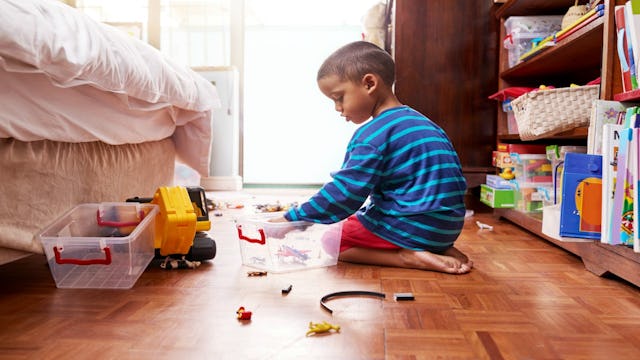Why My Toddler Does Chores Around The House

My favorite thing to do when my daughter was a baby was stand at the door of her preschool room and watch her through the window. Her daycare was in the same building as my job, so I’d sneak away for a few moments for my baby fix. Since she didn’t know I was there, I could observe her interacting naturally with her friends and teachers. There was always something cute to see, and occasionally, I would learn something about her that I didn’t know before.
Once, when she had transitioned into the toddler room, I got to the window just in time to see the end of lunch. I stood there in shock as I watched my “helpless” little baby finish her food, throw her plate in the trash, and then grab a towel to wipe down her spot at the table.
When we were at home, she sat strapped in a high chair, and I practically spoon fed her every bite. After she finished eating, I’d clean everything up while she played with toys and waited for me to tell her what to do next.
I had no idea who this little woman was at the daycare, but I wanted her to come to my house! The toddler that I knew was incapable of helping out around the house. Or was she? In that moment, looking at my independent baby doing her thing, I knew her caregivers were doing something right, and I wanted to know what it was.
At the end of the day, I approached her teacher demanding answers. How did you get my baby to be so helpful? Her teacher told me that she just taught her. Children are able to understand a lot by the time that they’re one year old. At that point, she starts giving them simple chores and tasks to complete, and they are eager to show that they understand.
I was blown away. My daughter could have been helping out with chores for months. Instead, in my desire to keep her a baby, I didn’t even see that she was ready for the responsibility. When we got home that night, I tested things out. Would she be interested in chores at home when she hadn’t had to do them before?
After dinner, I took her down from her high chair and put the tray on the floor. I gave her a rag and asked her to clean it off. She did! As she worked, she looked at me smiling, proud of what she was able to do and wanting to make sure I was watching her. That completely changed things. From then, I included her in the upkeep of the house. She wasn’t doing dishes or anything, of course, but I would let her dust the furniture or help push the vacuum cleaner. Eventually we got to a point where she would see little things that needed to be done, like paper that needed to be thrown in the trash, or something that needed to be straightened, and she would do it herself.
Now, at 9-years-old, my little girl is still incredibly helpful. She doesn’t complain (much) when she’s asked to help out around the house. She’s smart enough to find chores that she likes to do and does those things without even being asked. I think about what the alternative could have been if I hadn’t seen her pitching in that one day in her nursery class. Would she have been lazy? If she hadn’t started doing chores as a toddler, would I have to beg her to help out now?
Psychologists Felix Warneken and Michael Tomasello say that babies are naturally altruistic. They want to help out and don’t expect anything in return. My 15-month-old son loves throwing things in the trash for me, putting things away, and helping me straighten up by picking things up off the floor. Toddlers want to help, and we should let them.
Yes, sometimes it takes longer for us to get things done when our little ones “help.” Those extra few minutes will totally pay off in the future, though, when you have a 9-year-old who can wash dishes on their own. We have to make the time to allow our kids to learn.
I understand the desire to let them be little, but eventually toddlers grow up. Making chores and contributing to the household a part of their life — one that is ingrained and expected from an early age — just might be the difference between a child who hates pitching in and one who does it with pleasure. Or at least with minimal complaining.
This article was originally published on